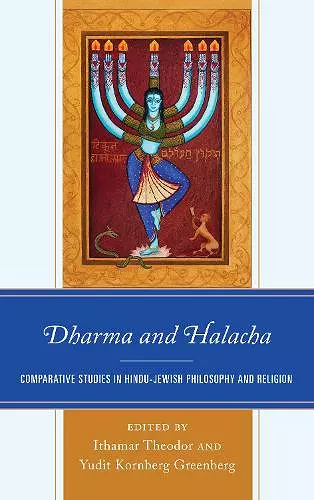Dharma and Halacha
Comparative Studies in Hindu-Jewish Philosophy and Religion
Ithamar Theodor editor Yudit Kornberg Greenberg editor
Format:Hardback
Publisher:Lexington Books
Published:15th Aug '18
Should be back in stock very soon
This hardback is available in another edition too:
- Paperback£37.00(9781498512817)

In recent decades there has been a rising interest among scholars of Hinduism and Judaism in engaging in the comparative studies of these ancient traditions. Academic interests have also been inspired by the rise of interreligious dialogue by the respective religious leaders. Dharma and Halacha: Comparative Studies in Hindu-Jewish Philosophy and Religion represents a significant contribution to this emerging field, offering an examination of a wide range of topics and a rich diversity of perspectives and methodologies within each tradition, and underscoring significant affinities in textual practices, ritual purity, sacrifice, ethics and theology. Dharma refers to a Hindu term indicating law, duty, religion, morality, justice and order, and the collective body of Dharma is called Dharma-shastra. Halacha is the Hebrew term designating the Jewish spiritual path, comprising the collective body of Jewish religious laws, ethics and rituals. Although there are strong parallels between Hinduism and Judaism in topics such as textual practices and mystical experience, the link between these two religious systems, i.e. Dharma and Halacha, is especially compelling and provides a framework for the comparative study of these two traditions. The book begins with an introduction to Hindu-Jewish comparative studies and recent interreligious encounters. Part I of the book titled “Ritual and Sacrifice,” encompasses the themes of sacrifice, holiness, and worship. Part II titled "Ethics," is devoted to comparing ethical systems in both traditions, highlighting the manifold ways in which the sacred is embodied in the mundane. Part III of the book titled "Theology," addresses common themes and phenomena in spiritual leadership, as well as textual metaphors for mystical and visionary experiences in Hinduism and Judaism. The epilogue offers a retrospective on Hindu-Jewish encounters, mapping historic as well as contemporary academic initiatives and collaborations.
This is a very welcome volume, the first edited collection of comparisons of Hinduism and Judaism since Hananya Goodman’s pioneering 1994 book (Goodman 1994). It is welcome because of its range and the quality of the contributors’ scholarship, and also because there are many fewer book-length studies than one might imagine. . . . this is a very well done and important work that will advance its field significantly. I recommend it highly for scholars, students, and other interested persons. * Journal of Dharma Studies *
This is a fine collection of essays on an important topic. Hindu-Jewish (and Indian-Israeli) connections are timely and significant. I recommend this work and congratulate Professor Theodor and Professor Greenberg on this pioneering effort. -- Nathan Katz, Distinguished Professor, Emeritus, Florida International University
Chapter by chapter, this edited collection reconstructs categories and unsettles assumptions that have long dominated how we imagine religion. The scholars included here lay out thoughtful, focused comparative studies of Hindu and Jewish ritual, ethics, and theology. Along the way, they de-center European and Northern American approaches to religion, engaging scholars from around the world. This is the globalization of the study of religion: rich data, diverse scholarly voices, and expansive frameworks that lead to new insights concerning the human religious experience. -- Kathryn McClymond, Georgia State University
Scholars who still think of comparisons between Hinduism and Jewish as unlikely, will find this volume a convincing argument for the possibility of comparisons. The book offers an important contribution to the growing field of Hindu-Jewish studies with many diverse and insightful articles, several of them opening up new avenues of research. The overviews of the field and full bibliographies make the volume a resource guide and suitable for classrooms. -- Alan Brill, Cooperman/Ross Endowed Professor, Seton Hall University
ISBN: 9781498512794
Dimensions: 238mm x 160mm x 24mm
Weight: 567g
272 pages